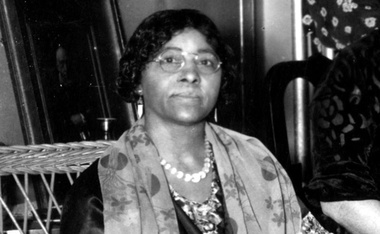In the modern epoch, the quest for racial justice has resonated profoundly, emanating from diverse quarters of society. Within the framework of the Baha’i Faith, this struggle is particularly salient, as it is intertwined with the core tenets that advocate for unity, equity, and the elimination of prejudice. Sadie Oglesby represents a resonant voice within this narrative, articulating a compelling vision for standing up against racial injustice. This discourse will delve into various facets of her message, examining the tenets of Baha’i teachings that support this vital advocacy.
At the heart of Baha’i teachings lies the principle of the oneness of humanity, which posits that all individuals, irrespective of their racial or ethnic background, are inherently equal. Oglesby’s reflections powerfully encapsulate this sentiment, emphasizing that true progress can only be achieved when societies recognize and embrace this innate equality. By articulating her message through personal anecdotes and broader societal observations, Oglesby invites listeners to reassess their perspectives on race and injustice.
Furthermore, the Baha’i teachings explore the notion of justice not merely as a legal concept but as a moral imperative. Oglesby, echoing this principle, posits that justice must prevail in all dimensions of social interaction. She asserts that individuals have a responsibility to challenge and dismantle systemic inequalities. Through her advocacy, Oglesby underscores the necessity for both individual and collective action in pursuit of racial equity. Justice, in her view, is not a passive state but requires active engagement and concerted efforts to foster change.
As Oglesby articulates her message, she often invokes the historical context of racial injustice in the United States and across the globe. The Baha’i teachings highlight the importance of historical awareness in understanding and addressing contemporary societal issues. Oglesby utilizes this lens to elucidate how the legacy of racism has permeated various institutions, and how this perpetuates societal discord. By grounding her arguments in historical realities, she enhances the urgency of addressing these injustices today.
In her discourse, Oglesby emphasizes the transformational power of education as a catalyst for social change. The Baha’i Faith places significant emphasis on the role of education in the development of moral character and the promotion of social justice. Oglesby advocates for educational initiatives that foster a deeper understanding of racial issues, encouraging individuals to engage in constructive dialogues about race and its implications on personal and societal levels. Through education, societal paradigms can shift, leading to more informed and compassionate communities.
Moreover, Oglesby invokes the concept of love and compassion, fundamental elements of Baha’i teachings, as essential tools in the fight against racial injustice. Her narrative reinforces the idea that transformative change stems not only from addressing structural inequalities but also from cultivating a culture of empathy and understanding. By fostering genuine connections among individuals of diverse backgrounds, societies can begin to heal and bridge the divides created by prejudice and discrimination.
In discussing solutions to racial injustice, Oglesby pays particular attention to the importance of grassroots movements. The Baha’i teachings advocate for community engagement and the empowerment of individuals to take initiative in addressing social challenges. Oglesby’s emphasis on grassroots activism serves to remind supporters that while systemic change is imperative, localized efforts can yield significant advancements. These movements champion the collective spirit, rallying individuals from all walks of life to converge upon a singular goal: the attainment of racial justice.
Indeed, Oglesby’s approach to racial justice is multifaceted, encompassing various dimensions such as emotional intelligence, social activism, and intercommunal dialogue. The Baha’i teachings encourage dialogue among diverse groups as a means of fostering understanding and breaking down barriers. By prioritizing conversations around race, individuals can grapple with their own biases and work collaboratively towards a more equitable society. Oglesby exemplifies this through initiatives designed to spark inter-community discussions focused on acknowledging injustices and envisioning equitable solutions.
Furthermore, Oglesby’s emphasis on intersectionality illuminates how different forms of discrimination—be they based on race, gender, or socioeconomic status—are interrelated. Baha’i teachings stress the significance of viewing social justice through a holistic lens, acknowledging how overlapping identities can shape an individual’s lived experiences. In recognizing the interconnectedness of various struggles, advocates are better equipped to forge inclusive coalitions that amplify diverse voices in the pursuit of justice.
Importantly, Oglesby acknowledges the role of spiritual transformation in the struggle for racial justice. The Baha’i Faith places profound emphasis on the cultivation of virtues such as patience, humility, and courage. Oglesby’s message impels individuals to embark upon personal journeys of introspection, reevaluating their beliefs and biases. This internal evolution can ultimately lead to a more profound commitment to social justice, empowering individuals to act with conviction in the fight against racial injustice.
In conclusion, the teachings articulated by Sadie Oglesby serve as a clarion call for justice within the Baha’i framework. By embracing the tenets of unity, justice, education, and love, she inspires individuals to engage in the persistent struggle for racial equity. The narrative she weaves is one of hope and resilience, emphasizing the collective path toward a world free from racial prejudice. As advocates for justice continue to arise, they must remain steadfast in their commitment to fully realize the vision of a unified humanity, as enshrined in Baha’i teachings.
